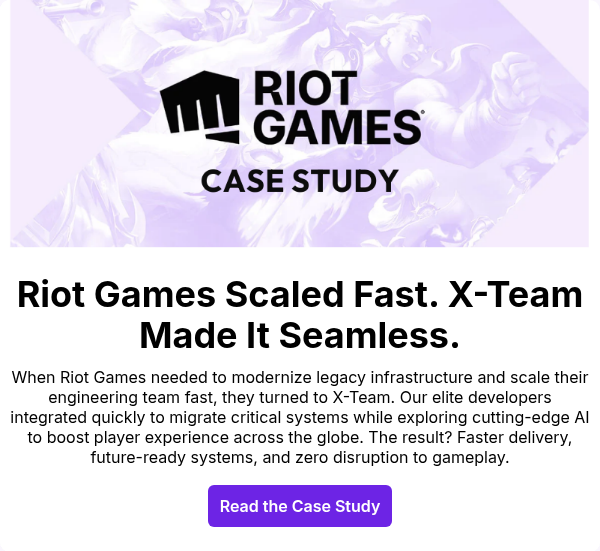Game Development Outsourcing Companies: Choosing the Right Partner
July 30, 2025 13 min read

The demands of the modern video game industry have never been more intense. For many teams, working with game development outsourcing companies is the only realistic way to keep production on track without burning out.
But outsourcing only works when the partner feels like part of your team. Too often, studios end up with support that’s going through the motions or encounter churn that stalls progress midbuild.
Whether you’re shipping major updates, modernizing legacy systems, or launching a new mobile game, the right partner helps you keep things moving forward.
Comparing the Top Game Development Outsourcing Companies
The market for gaming project outsourcing is crowded, with a wide range of outsourcing options available. But not every development outsourcing company has the right model or fit for your company’s needs.
This comparison rounds up some of the leading gaming developers in 2025, showing where each fits best. Whether you're looking to outsource mobile game development or scale your core team, the right partner will help you keep your projects moving forward.
|
Company |
Best For |
Limitations |
|
X-Team |
Best For: Embedded devs for long-term projects Strengths: Fast ramp-up, culture fit, global reach |
Not for one-off builds |
|
Virtuos |
Best For: Large-scale co-dev and art Strengths: AAA credits, broad services |
Slower onboarding |
|
Sperasoft |
Best For: Structured AAA co-dev Strengths: Full-cycle, global team |
Less agile, slower ramp-up |
|
Kevuru |
Best For: Midmarket art and full-cycle builds Strengths: IP experience, flexible pricing |
Not ideal for AAA at scale |
|
Room 8 |
Best For: AAA art, porting, large publishers Strengths: High-quality output, scale fast |
High minimums |
|
Argentics |
Best For: Custom/ experimental games (VR, blockchain) Strengths: Creative, flexible, boutique model |
Limited scale |
|
Juego |
Best For: Fast, affordable mobile or AR/VR builds Strengths: Cost-effective, fast delivery |
Not built for AAA |
|
Nuare |
Best For: High-end visuals and cinematic art Strengths: AAA fidelity, seamless integration |
Limited dev services |
|
Quytech |
Best For: Startups building mobile, AR/VR, AI experiences Strengths: Innovative, low-cost, fast-moving |
Not for enterprise-grade co-dev |
|
Cubix |
Best For: Mobile games and branded gamification Strengths: Speed, price, frontend polish |
Not for core/AAA gaming |
X-Team
Best for studios that need full-time, embedded developers who onboard fast, integrate seamlessly, and stay with you over time.
X-Team supplies elite gaming developers who work inside your systems, follow your workflows, and contribute from day one. Unlike traditional outsourcing vendors, X-Team focuses on long-term partnerships with engineers who stay aligned throughout the development lifecycle. This model is ideal for studios scaling live ops, building multiplayer systems, or modernizing legacy code — not for one-off asset drops or full game builds.
Strengths: Human-vetted talent, fast ramp-up, culture fit, flexible scale, global reach, high retentionLimitations: Optimized for long-term collaboration rather than one-off tasks
Virtuos
Best for large studios seeking scale, cross-platform support, and a partner with a proven track record on major titles.
Virtuos is one of the largest names in game development outsourcing, with a global team and credits on some of the industry's most well-known titles. Their services include co-development, porting, remastering, and game art. While a solid choice for large publishers or AAA game development, smaller studios may find the onboarding slower and the experience less personalized.
Strengths: Proven experience with high-budget AAA games, broad service offering, global capacity
Limitations: Slower integration, less flexible for smaller or fast-moving teams
Sperasoft
Best for large studios with long-term, structured projects that need proven co-development at scale.
As part of Keywords Studios, Sperasoft has contributed to major franchises like Halo, FIFA, and League of Legends. With teams across the US, Europe, and Asia, they support engineering, porting, live ops, and full-cycle production. Among outsourcing game development companies, they’re known for reliability and reach more than for fast pivots or lean integration.
Strengths: AAA franchise experience, full-cycle delivery, global infrastructure
Limitations: Slower ramp-up, less suited to agile teams or short-term work
Kevuru Games
Best for midmarket studios that need flexible, cross-discipline support across game art and full-cycle development.
Kevuru Games provides end-to-end services across 2D/3D art, UI/UX, animation, and code, with IP experience on titles like Fortnite and Star Wars. They're a strong fit for midsize or large teams looking to outsource mobile game development or scale up visually intensive projects. While competitively priced and collaborative, they may not always have the bandwidth for large AAA co-dev efforts running concurrently.
Strengths: Broad creative output, adaptable pricing, experience with high-profile IP
Limitations: Less suited to massive AAA co-dev or rapid high-volume parallel builds
Room 8 Studio
Best for large publishers needing AAA-quality art and porting, with the structure to scale teams quickly across platforms.
Room 8 Studio is known for delivering premium game art, animation, and co-development for top franchises. Their services appeal to game production companies looking for polish and reliability across remasters, cross-platform porting, and high-volume art. While a strong partner at scale, their model is often less accessible for indie or experimental work.
Strengths: Visual fidelity, rapid scaling, trusted by major publishers
Limitations: Higher minimums, not ideal for lightweight or quick-turn projects
Argentics
Best for studios building custom, immersive experiences, particularly in VR, blockchain, and next-gen platforms.
Argentics combines code, art, and game design for highly tailored project requirements, including AR/VR game development, gamification, and experimental formats. As game dev outsourcing partners, they lean more toward boutique than a scaled production house. Their transparent process and creative edge are ideal for innovation-driven studios, but they’re less equipped for high-volume pipelines.
Strengths: Custom engagement model, innovation across formats, strong art and code integration
Limitations: Limited bandwidth for repeatable, long-term asset delivery
Juego Studios
Best for cost-conscious studios looking for rapid delivery, cross-platform support, or niche services such as VR and gamification.
Based in India, Juego Studios offers full-cycle development, game art, and emerging tech capabilities like AR/VR and blockchain. They're a strong fit for mobile-first studios or those exploring new formats. Their cost efficiency and speed make them popular at the midmarket level, though they can stretch to large-scale AAA projects or multiple concurrent builds.
Strengths: Competitive pricing, wide platform coverage, fast turnaround
Limitations: Less suited to large-scale AAA or heavily concurrent projects
Nuare Studio
Best for studios that want AAA-quality visuals and cinematic art pipelines that slot directly into high-end game production.
Nuare Studio is known for delivering premium concept art, design, and animation to top-tier titles like The Last of Us Part II, Ghost of Tsushima, and Fallout 76. Their team handles everything from character modeling to cinematic VFX, making them a top choice for visually ambitious, high-quality games. While less focused on engineering-heavy or short-cycle dev work, they’re a trusted partner for art-first builds and AAA polish.
Strengths: AAA visual fidelity, seamless integration, broad art and animation services
Limitations: Less suited to rapid engineering or short-term code sprints
Quytech
Best for startups or studios exploring mobile, AR/VR, or AI-driven game experiences with a strong value-for-cost proposition.
Quytech specializes in plugging in Unity and Unreal developers for mobile and immersive platforms. Their agility, experience with AI and blockchain, and attractive pricing make them an appealing option for early-stage or fast-moving teams seeking scalable game development. Quytech stands out among top game development outsourcing companies for innovation but may lack the capacity for large, AAA-scale co-development.
Strengths: Mobile-first expertise, innovation in AR/VR/AI, affordable pricing
Limitations: Not built for large-scale, enterprise-grade live ops or co-dev
Cubix
Best for teams that need fast, affordable mobile game builds or gamified apps with a polished frontend.
Cubix focuses on mobile game development and gamification for brands, education, and entertainment. They’re not a fit for large-scale console or PC titles, but for mobile-first studios or businesses exploring interactive experiences, they offer solid delivery at startup-friendly pricing. Among game development agencies, Cubix stands out for speed and cost-efficiency — though their projects lean more B2C and less core gaming.
Strengths: Mobile game expertise, fast turnaround, frontend polish
Limitations: Not suited for AAA games, live service pipelines, or deep technical complexity
7 Things to Look for in a Game Outsourcing Company
Outsourcing is a force multiplier when done well. But not all vendors can handle live pipelines, complex codebases, or the demands of fast-moving game development studios. Before you bring in outside help, make sure they’re equipped to match your pace (and your standards). Here’s what to look for when hiring gaming software developers.
Knowledgeable About the Engine, Not Just the Genre
The best game outsourcing companies or game development partners have built real systems with Unity or Unreal Engine, rather than dabbling. Whether you’re hiring mobile game developers or targeting consoles and PCs, make sure your partner brings proven experience across the engines your game depends on.
Ramps Up Quickly
Technical skill is the starting point. But the best gaming software developers understand your tools, align with your culture, and contribute without slowing the team down. Look for engineers who adapt to your workflows, respect your rituals, and move at your speed from day one.
Takes IP Protections Seriously
Your game’s core ideas, mechanics, and assets are invaluable. The right game outsourcing company will have airtight nondisclosure agreements, secure infrastructure, and a track record of protecting client IP. This is especially important when working on multiplayer systems, live ops, or new platform launches.
Ships Code That Holds Up
Outsourcing should lead to production-ready clean code, not more work for you. Whether you’re working with embedded developers or broader game development services, prioritize partners who write code that’s stable, scalable, and easy to maintain.
Pros at Async Collaboration
Game development projects often extend across time zones. Whether your vendor is supporting QA, art, or engineering, they should excel at async collaboration. That means communicating clearly and staying in sync even when your team is offline.
A Strong Track Record
Marketing decks don’t ship games. If a studio claims to be a top game development outsourcing company, it should be able to share which titles, live code, and assets have held up under pressure. Look for proof, not potential.
Feel Like Part of Your Team
The best outsourced game developers act like they’re part of your in-house team. That means engineers who stay aligned over time, follow your roadmap, and evolve with your product rather than parachuting in and cycling out right after the sprint ends.

Outsourcing Mobile Game Development
Mobile games demand different skills than PC or console games. Every frame, tap, and backend call has to perform under real-world constraints — on hundreds of types of devices, often over shaky networks. Great mobile game developers build with this reality in mind. They optimize early, test obsessively, and design systems that hold up over time.
That’s where game-native teams stand apart. Generalist firms might get you to a working build, but that doesn’t mean it’ll scale. We’ve seen studios struggle when they bolt on mobile as an afterthought, as they wind up with bloated apps and backend outages.
Whether you’re building from scratch or scaling a live service, our developers adapt fast and stay aligned across the entire product lifecycle. That’s why mobile teams choose X-Team when they can’t afford to stall.
Why Game Studios Trust X-Team
When the pressure’s on, you don’t want to explain your stack. You need developers who’ve shipped with Unity, Unreal, and custom engines.
Our engineers quickly plug into your sprint and roadmap, whether you're prototyping or scaling global live ops.
X-Team offers more than basic game talent. Our software development solutions support studios across backend systems, cross-platform builds, and live infrastructure. You’re not cycling through vendors. You’re building a long-term partnership with developers who grow alongside your game.
Our model supports every phase of development, from the first line of code to post-launch support. Studios building AAA, mobile, and multiplayer experiences choose X-Team because we move at the same speed they do.
Need developers who think like game co-creators, not external vendors?
Find out how X-Team connects you with embedded gaming developers who feel like part of your team from day one.
TABLE OF CONTENTS




